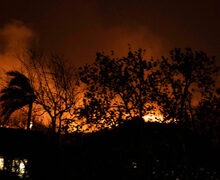Revisiting history is vital for advancing social justice
Dan Lyon | Asst. Photo Editor
The School of Education recently announced a new interdisciplinary minor: Atrocity Studies and the Practices of Social Justice.
The School of Education recently announced a new interdisciplinary minor: Atrocity Studies and the Practices of Social Justice. This new line of coursework will be incredibly useful in teaching students how to better empathize with and care about others, well beyond their time at Syracuse University.
“Atrocities” is a broad term that encompasses war crimes, crimes against humanity and genocide. These severe human rights violations have plagued global history.
Analyzing the past is crucial in practicing social justice in the present. Unpacking events retrospectively allows us to examine it from all angles. We see the beginning, middle and end of these atrocities. Because of that, we are able to witness how they resonate in society.
Revisiting history is more than just knowing what happened in the past. It requires assessment through a modern lens.
Robert Terrell, an assistant professor in SU’s department of history, said the purpose of the minor is to prepare students to be engaged citizens, advocates, scholars and leaders.
“Being engaged citizens, advocates, scholars and leaders in the world of today requires that we understand the multiple and layered ways that people alienate, hierarchize, dehumanize, marginalize and persecute one another, as well as the many ways that we can and do try to challenge those processes,” said Terrell, in an email.
The minor incorporates various courses on historical genocides, challenging dehumanization and education. The only required course of the minor is HST 362: Nazi Germany and the Holocaust.
Terrell — who teaches HST 362 — said that the Holocaust is central to the study of global atrocities.
“The Holocaust was human atrocity on such a scale that it fundamentally altered the way that human beings think about each other,” Terrell said.
Although the minor is based out of the School of Education, it’s applicable to almost any major. Issues of social justice filter through many career fields, and that’s why this minor is important to spotlight. Students in various disciplines should take courses like that.
“The minor coursework would help them recognize inequalities and develop skills to address unjust practices in the public and private sectors within a range of fields, including education, health care, law, economics, media, journalism, human services and public service,” said Julia M. White, an assistant professor at the School of Education, in an email.
There’s no limit as to how this minor can be applied to the real world. In the end, it’s our responsibility to understand the past to form a safe and just future.
Jennifer Bancamper is a sophomore English and textual studies major. Her column appears biweekly. She can be reached at jbancamp@syr.edu.

Published on January 27, 2019 at 11:54 pm





